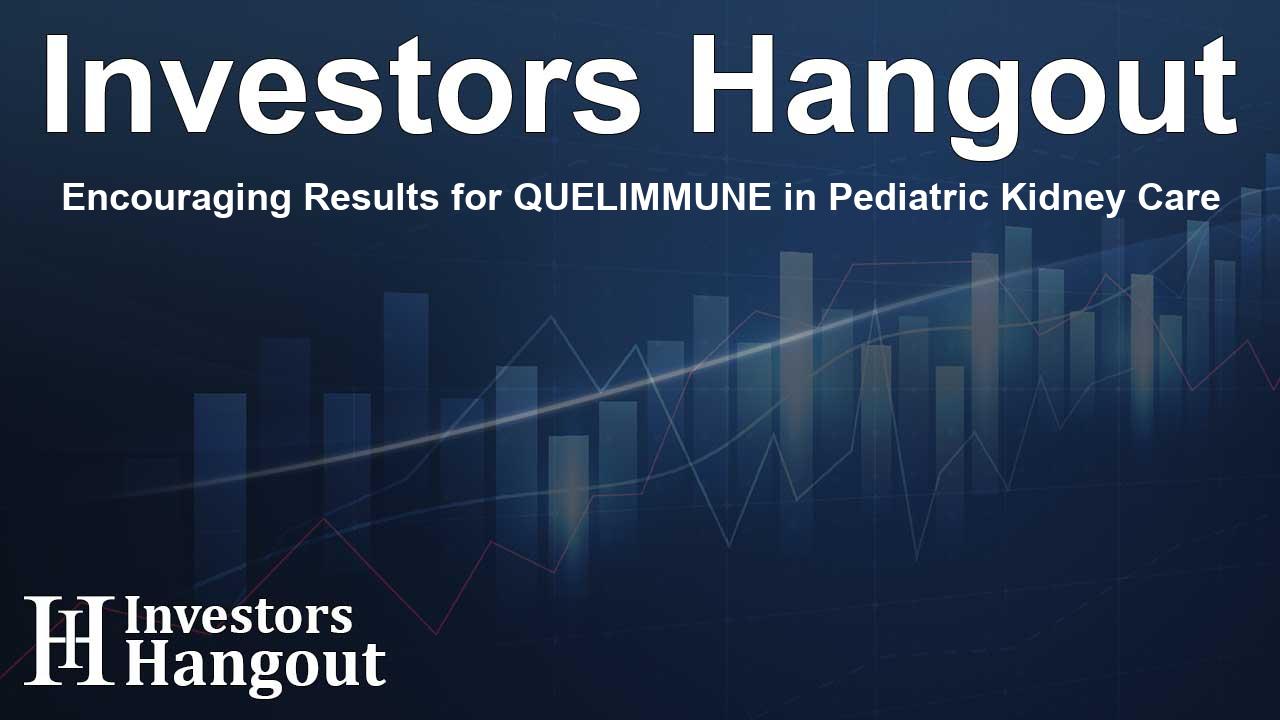Encouraging Results for QUELIMMUNE in Pediatric Kidney Care

Positive Preliminary Results for QUELIMMUNE Therapy
SeaStar Medical Holding Corporation (NASDAQ: ICU), a leader in healthcare innovation, recently shared exciting early findings regarding its QUELIMMUNE therapy designed for pediatric acute kidney injury (AKI) patients. The outcomes showcase a positive response during the early stages of treatment, especially for those battling severe kidney issues often associated with critical health conditions.
Key Findings and Data Overview
At a recent symposium, SeaStar Medical reported robust preliminary data gathered from the SAVE Surveillance Registry. In a study involving 21 pediatric patients, there were no adverse events linked to the device, indicating a high safety profile. Patients exhibited promising survival rates—76% at Day 28 and Day 60, and 71% at Day 90. These figures suggest the potential for QUELIMMUNE to significantly improve outcomes when compared to historical survival rates.
Effective Treatment for High-Risk Patients
Patients undergoing QUELIMMUNE therapy showed compelling resilience. Particularly interesting was the survival data for those requiring extracorporeal membrane oxygenation (ECMO) alongside QUELIMMUNE therapy, revealing a 60% survival rate at Day 90. Moreover, many survivors were able to regain kidney function without the need for dialysis, highlighting the therapy's effectiveness.
Clinical Perspectives on QUELIMMUNE Therapy
Dr. Stuart Goldstein, a prominent nephrologist, expressed optimism about the QUELIMMUNE therapy, noting its potential to alter the treatment landscape for pediatric patients with AKI. The prevailing clinical need for innovative solutions to combat the aggressive immune responses in these vulnerable patients has driven interest in treatments like QUELIMMUNE.
Ongoing Commitments to Safety and Efficacy
The SAVE Surveillance Registry serves a critical role in validating QUELIMMUNE therapy in real-world settings. This initiative is not just about gathering data; it aims to substantiate safety and improve treatment methodologies for patients across various health institutions. As more evidence emerges, it could influence healthcare practices, insurance discussions, and lead to wider adoption of the therapy.
Broader Implementation and Future Prospects
QUELIMMUNE therapy has gained traction in leading pediatric centers, a positive sign for its adoption in critical care. The Selective Cytopheretic Device (SCD) involved demonstrates versatility and effectiveness in managing hyperinflammation—an underlying cause of organ damage. This pivotal therapy has the potential to transform treatment approaches, aiming not just for immediate survival but for sustainable long-term health outcomes.
A Look into Acute Kidney Injury (AKI)
AKI represents a sudden decline in kidney function and can be triggered by numerous factors such as sepsis, severe trauma, or surgical interventions. Children experiencing AKI may face severe complications, leading to chronic conditions. Understanding and mitigating hyperinflammation are essential to safeguarding these patients' futures.
SeaStar Medical’s Mission and Vision
At SeaStar Medical, the commitment to advancing healthcare solutions for critically ill patients remains a driving force. The QUELIMMUNE therapy stands as a testament to innovative practices aimed at reducing the burden of acute conditions and improving survival rates for pediatric patients. With significant endorsements and ongoing clinical trials, the future appears promising for this path-breaking therapy.
Frequently Asked Questions
What is QUELIMMUNE therapy?
QUELIMMUNE therapy is an innovative treatment aimed at managing pediatric acute kidney injury (AKI) in critically ill patients, utilizing a patented Selective Cytopheretic Device.
What are the survival rates reported for QUELIMMUNE therapy?
Preliminary findings indicate survival rates of 76% at Day 28 and Day 60, and 71% at Day 90 among pediatric patients treated with QUELIMMUNE.
Is there evidence of adverse effects from QUELIMMUNE therapy?
According to the latest data, there have been no reported device-related adverse events, showcasing QUELIMMUNE's strong safety profile.
How does QUELIMMUNE therapy work?
QUELIMMUNE therapy functions by targeting hyperinflammation in the body, effectively changing the course of immune responses that may harm vital organs like the kidneys.
Where is QUELIMMUNE therapy currently being used?
QUELIMMUNE therapy is being implemented in recognized pediatric medical centers across the United States, enhancing treatment options for critically ill children.
About The Author
Contact Dominic Sanders privately here. Or send an email with ATTN: Dominic Sanders as the subject to contact@investorshangout.com.
About Investors Hangout
Investors Hangout is a leading online stock forum for financial discussion and learning, offering a wide range of free tools and resources. It draws in traders of all levels, who exchange market knowledge, investigate trading tactics, and keep an eye on industry developments in real time. Featuring financial articles, stock message boards, quotes, charts, company profiles, and live news updates. Through cooperative learning and a wealth of informational resources, it helps users from novices creating their first portfolios to experts honing their techniques. Join Investors Hangout today: https://investorshangout.com/
The content of this article is based on factual, publicly available information and does not represent legal, financial, or investment advice. Investors Hangout does not offer financial advice, and the author is not a licensed financial advisor. Consult a qualified advisor before making any financial or investment decisions based on this article. This article should not be considered advice to purchase, sell, or hold any securities or other investments. If any of the material provided here is inaccurate, please contact us for corrections.
